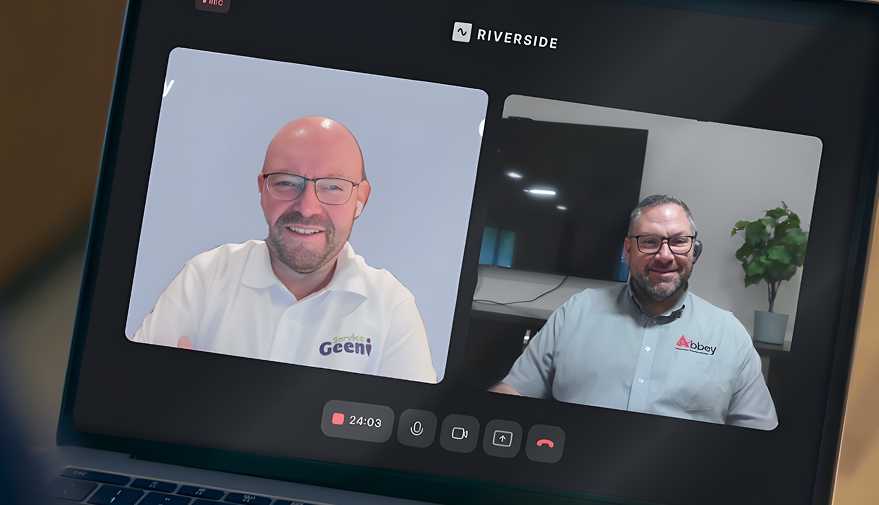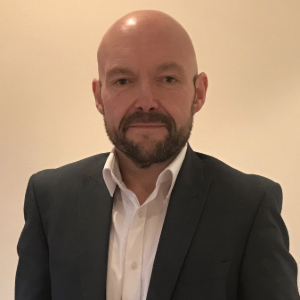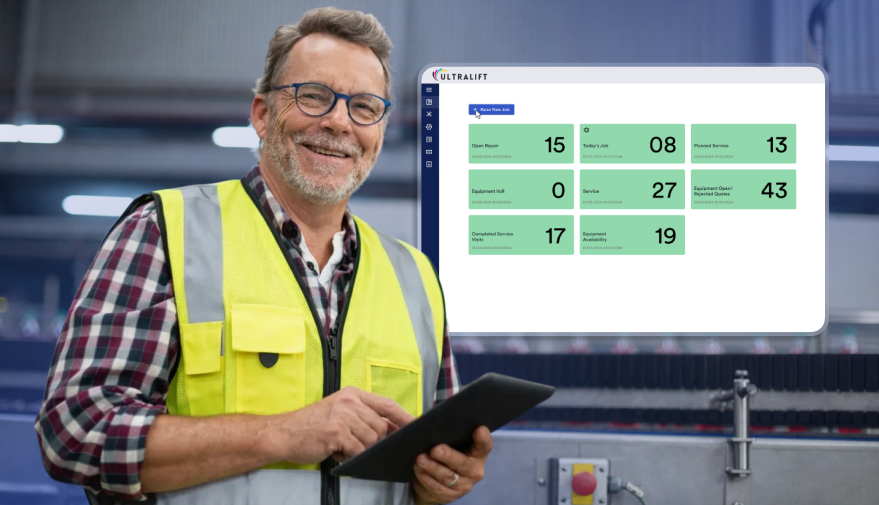Delivering Service Excellence: Inside Abbey's Operations

Welcome & Introduction
Adrian Clark (00:00)
Hello and welcome to Delivering Service Excellence Inside Abbey's Operations. Today we're joined by Paul Kelly, Operations Director at Abbey, who are one of the UK's leading material handling specialists. And in this session, we'll be exploring a little bit about how Abbey has built and maintained a reputation of excellence, service excellence over decades. Everything from the culture that drives their teams to the systems and partnerships that keep their operation running smoothly. And we'll also look at how technology and collaboration included in their work with Service Geeni play a key role in delivering consistent results for basically for their customers across multiple industries. So, hi Paul, how are you doing?
Paul Kelly (00:41)
Hello Adrian, how are doing? Thanks for having me.
Adrian Clark (00:42)
Yeah, you're welcome. Well, it's good to see you again. Just one slight other note, just during this webinar, obviously, if, you do have questions and please feel free to put them in the chat as Paul and I will be on hand to answer all of them as best we can. So it's probably worth just setting the scene a little bit Paul. So could you just tell me a little bit about Abbey and obviously your role as the operations director and what does service excellence mean to you and your customers?
Paul Kelly (01:13)
Yeah, thanks Adrian. Abbey has a proud history supporting materials handling industry from cradle to grave really over the last 40 years, built on a foundation of reliability and a commitment to aftercare and maintenance, strong maintenance. As operations director, I oversee the day-to-day operation of our business and ensure that the team delivers on the promise of service excellence.
Adrian Clark (01:40)
Yeah, and I bet that's a quite difficult role, isn't it? Because you really need to be across everything all at all at the same time, really, I imagine.
Paul Kelly (01:46)
Yeah, and data will, you know, as we'll talk about further on plays a massive role in that.
Adrian Clark (01:54)
Indeed. So, I mean, I've been in this industry for over 20 years now. And I know obviously, Abbey had been around for decades. What do you think has kept customers coming back year after year?
Customer-Centric Culture & Values
Paul Kelly (02:07)
I think our customers return because they trust us to deliver. You know whether that be next day, the robust aftercare that we provide, ongoing maintenance and the expertise of our engineers set us apart. And we've built those long-term relationships by consistently putting customers first and adapting to their needs.
Adrian Clark (02:32)
Excellent. So how, how would you describe the culture within Abbey then when it comes to putting customers first?
Paul Kelly (02:39)
Our culture is rooted in three core principles really, reliability, integrity, and an openness to continuous improvement. And to do that, we empower our team to take ownership and act quickly. Our values and our history drive us to always look to enhance the customer experience.
Adrian Clark (03:00)
Yeah. I mean, it's got to start at the top that I think, hasn't it really? Cause I mean, I know Paul that is, I believe he's the current MD director, isn't he? At the minute. And I've obviously known Paul for quite some time and it's always struck me that that's really core in the family's sort of ethos, if you like, about running that business.
Paul Kelly (03:08)
Yeah, yeah, we are and we'll always maintain no matter how big we grow, the family values are key and that is 100 % from Paul, myself and Chris as the three directors. know, that cascades down to the team.
Industry Challenges & Operational Demands
Adrian Clark (03:41)
Great stuff. So if we talk a little bit about your operational challenges and your priorities, what are some of the biggest challenges that you're facing with delivering that consistent high level of service across industries like, I don't know, logistics, retail, automotive.
Paul Kelly (03:58)
Yeah, great question. Each industry has unique demands. Tight delivery windows in logistics, high expectation for uptime in retail and strict safety standards within the automotive sector. We overcome these by investing heavily in training, leveraging technologies and maintaining open communication to customers to anticipate and resolve issues quickly.
Adrian Clark (04:25)
Yeah, I mean, we work in a lot of the same industries as you guys. So we have a lot of customers in common, not least in the fork truck industry, but obviously we also work with the likes of sort of Next or Clarks, British Gas, those sorts of people where dot com logistics is a really important part of what they do and getting the goods, if you like, through that warehouse as quickly as possible is key. So making sure that they can keep all the equipment running, whether it be for trucks or conveyor belts is absolutely pivotal to them, isn't it? So you must obviously have to, you know, respond as quickly as humanly possible to keep that customer moving.
Paul Kelly (04:59)
Yeah, for sure and consistency in that is key. know, every phone call that comes in has to be met with the same empathy and the same consistency. So it doesn't matter how busy we are, the customer, whoever makes that call, needs to feel like our undivided attention is on that individual. And that's what we work hard on.
Adrian Clark (05:30)
Yeah, absolutely. So how, how do you balance that demand then for, for speed versus efficiency with maintaining that quality and safety? Because again, they can't be sacrificed, can they?
Paul Kelly (05:42)
No, no, it's a consistent balance enacting. It's a fine, it's a fine line. We use robust processes, regular audits to ensure that speed never comes at the expense of quality and safety. Our teams are trained to prioritise safety and quality even under pressure.
Adrian Clark (06:04)
Yeah, because it's absolutely pivotal, isn't it? That's not something that can be, you know, can be allowed to suffer. So as an operations director, what are the areas you're most focused on sort of improving the day to day running of the business?
Paul Kelly (06:19)
I'm really focused on streamlining workflows and enhancing the team's communication capabilities and leveraging data to drive decision making. Continuous improvement in these areas helps us deliver a better service and adapt to our ever-changing customer needs and demands.
Adrian Clark (06:42)
Yeah, data is really king, isn't it, having those data points.
Paul Kelly (06:44)
It is, yeah.
Technology, Data & Collaboration with Service Geeni
Adrian Clark (06:48)
Well, if we talk a little bit then about how Abbey delivers that service excellence, because I think that's obviously something people will be sort of keen to understand. So could you give us an example of our time, when a customer has come to you with a really tough requirement and what it's taken to actually make that work?
Paul Kelly (07:08)
Yeah, again, it's an example of data availability, the team's expertise. So having a completely packed out schedule, large customer made a demand on needing a requirement and installation to deliver their equipment. And the team have absolutely everything at their fingertips and have a desire to support and help.
So they took that challenge from that customer, coordinated all the equipment and manpower needed and slotted it in and completed ahead of expectation, which is just another example of what the team do day to day really. That's not a one-off example. That's a daily juggling act that they pull off.
Adrian Clark (07:58)
Yeah. And I don't think people fully appreciate how stressful it can be working in the service industry, know, answering calls from customers that are in dire need. Because obviously the turnaround time, as I mentioned before, of trying to get goods through a warehouse, for example, or, you know, a shipment onto the back of a lorry, you know, that's got to be met, you know. So for your guys, I imagine answering the phone and dealing with those service calls, it can be quite stressful.
Paul Kelly (08:05)
Yeah, and we invest heavily in stress training, anxiety, know, the team. If you work in service, that's par for the course that those conversations and those phone calls are coming in day to day. But we do invest heavily in behind the scenes in welfare and etc. So it just helps. It makes the environment calm.
Adrian Clark (08:43)
Mm-hmm.
Paul Kelly (08:54)
Nice supportive environment so when those challenges and those balls need juggling yeah it makes a massive difference.
Adrian Clark (09:03)
That's really good to hear, you know, and I also think it's probably quite unique in materials handling, investing in ensuring that people can manage those stress levels because I think people don't appreciate that that can have a big impact on the way that people work. And actually, certainly in our business, it's core, you know, it's the people that make the product. You know, we are the company and that's clearly the ethos at Abbey as well.
Paul Kelly (09:29)
Yeah, 100 % you know, the team are everything. So without them, you know, nothing works. So it's key to keep them happy and motivated. So, yeah.
Adrian Clark (09:36)
Hmm.
Great. So what else do you think makes Abbie stand out from, from, don't know, compared to your other sort of providers in the market, because like, you know, like every business, there's always competitors that are trying to win your business from you and obviously you're trying to do the same to them. So what is it that makes you guys stand out from others in the market?
Paul Kelly (10:04)
The biggest rules is reliability, integrity and a proven track record really. We have statistics that show our service levels continuously outperform our competitors. And it's not just our stats that tell us that. Our customers regularly cite our dependability as a key reason for choosing Abbey time after time after time.
Adrian Clark (10:29)
Yeah. I mean, again, as I mentioned earlier, we do have a lot of customers in common. And that's one thing that I always hear when I'm speaking to them, you know, about the reliability and the integrity, obviously of Abbey and how important that is obviously to them as the consumer, if you like, how, how easy is it or how do you embed those values in your day-to-day operations though? Cause I think that must be a tricky balancing act.
Paul Kelly (10:56)
It is and I think your values have to be omnipresent within your organisation. It's just how we are. But on top of that, we embed these values through regular training, open feedback sessions, transparent communication and holding ourselves accountable to the highest of standards. And every team member understands the importance of keeping the promise and acting with honesty.
Adrian Clark (11:26)
Yeah. And I think that can't be a understated enough really, can it, I mean, it's overstated, I guess it's the integrity, honesty, and how you carry yourself and you, sort of attack that work and everything in one go, think is really important. So if you talk a little bit, if we sort of dig, guess a little bit deeper in, into, you know, into how you're enabling the business to sort of succeed. So to deliver the service at the sort of scale that you guys are doing.
Paul Kelly (11:38)
Yeah.
Adrian Clark (11:54)
There's got to be some strong processes and systems in place, I imagine. So what roles, I guess, do the tools and technology play in making everything else work really smoothly?
Paul Kelly (12:08)
For sure, technology, it's the backbone of our operation. From scheduling, real-time tracking, our systems ensure that everyone around the business has the information they need to deliver fast, accurate service. You know, it's imperative that the technology supports everything that we need to deliver.
Adrian Clark (12:35)
Yeah. So how, how do you make sure then that the team has that information at the right time to be able to respond quickly? Because obviously you can get information after the fact, can't you? Which is, you know, okay, I guess if you want to look retrospectively, but you know, from what I know about you guys, you want to be ahead of the game. You know, you want to stop that problem before it even starts or becomes a big problem. So how, how do you manage that?
Paul Kelly (12:59)
But we have several and we use integrated platforms that centralise our data and enable an instant communication process for the customer. This ensures the team always have the data available to respond to the customer's needs without delay. So it doesn't matter who takes the phone call. We have to hand absolutely everything that that customer
The teams empowered to deliver whatever they need.
Adrian Clark (13:30)
Yeah, so that's I guess that's an important point, isn't it? So I take it is one single source of truth. So everybody has the same data and all of that data is consistent.
Paul Kelly (13:39)
Yeah. So even if it's not one system, the APIs map all the data into one, like you say, source of truth that allows us to check on inventory, real time tracking, where's the engineer up to? Yeah, absolutely everything needed to deliver what that customer's asking or answer the question.
Adrian Clark (14:05)
Yeah. And in my experience, many businesses do struggle with that visibility and that communication across the business. So, mean, I know you've touched on APIs, but is there anything else that's really helped you overcome that lack of visibility and lack of communication?
Paul Kelly (14:24)
Just investing in the right technology and fostering that culture of openness. Regular team briefings, clear escalation paths mean that issues are spotted and resolved quickly.
Adrian Clark (14:41)
Yeah, that's great. So we just talk a little bit about the partnership between Abbey and Service Geeni. So I think, as I mentioned at the top of the call, I've been with the business now for just over 20 years. And I'm, think we've probably worked with Abbey now for at least half of that. So that's, you know, that's gotta be a decade or certainly getting on for that, which is, which is no mean feat, I think. So how has working with Service Geeni, how has that supported you guys in achieving your goals?
Paul Kelly (15:12)
It's been pivotal really. Service Geeni has allowed us to streamline our processes. It's improved visibility around the business for information and enabled us to respond to customers needs much more efficiently. It's certainly been a key enabler in our drive for service excellence.
Adrian Clark (15:33)
Good. I'm glad to hear that. Otherwise Paul might be on the phone to me and I wouldn't want that. So, ⁓ has it made a difference in the team from a practical perspective day to day? So I know from a, from a business perspective, obviously what, what someone like yourself or whoever in the business, they, they may want to see certain bits of information, but just the general team on a practical day to day level, has it, what difference has, if any, is it, is it made to them and the way they work?
Paul Kelly (15:36)
Yeah, as we've said a number of times now, the availability of data as one repository to allow us to move forward it's massive. The team is much more connected. And I mean that, so not just the planners, because the system allows them to be the parts team, the customer care team, the accounts team, everyone's got visibility. And that's what's allowed us to resolve issues much faster. It certainly reduced manual work and it's freed up a huge amount of time again for us to communicate and deliver better service.
Adrian Clark (16:48)
Yeah. And just picking up on something you said there about parts, for example. I mean, I think it is a pivotal thing, isn't it? When you've got people want to get this first time fixed on as much as possible. You know, I think that's a big driver for the industry. It certainly has been for the last sort of five plus years. It's definitely come to the fore, but even little things, think like being able to quickly and efficiently order those parts, but knowing the service team, knowing that parts have come in for a particular job that need a quick turnaround. think that that's one of those little things. It seems a little, actually does make a big difference, doesn't it?
Paul Kelly (17:24)
Yeah, just being able to see outstanding items on a PO, goods receipt numbers, got, you know, all of those things that are linked through one source. If we've got a customer rings up, where's the parts up to or wherever, just by, you're in the one screen and it allows us to feedback all that information. It really has made a difference to the customer care team and the planners.
And just freeing up phone calls because historically we would have been ringing the parts, where's this part up to? And now having the different icons on the jobs themselves, just it frees up that. So when you're doing two and a half thousand jobs, a fortnight really, and you can remove one phone call of each of those jobs.
It's massive in terms of the improvement that comes from having that information to hand.
Adrian Clark (18:29)
It is, and that's a really good point. It's a lot of the intangibles that people don't think about. I mean, again, I've done this for a long time. When you're talking to people, you want to try and build that value and you want them to, we try to quantify as much as we can, but there's a load of things that sit between the cracks where it saves a couple of minutes here or a couple of phone calls less there. And that makes a big difference over a period of time, doesn't it?
Paul Kelly (18:52)
it does huge and that's what we've seen really that's been the benefit.
Adrian Clark (18:58)
Excellent. I'm glad to hear that. So I don't know, if Service Geeni was taken away tomorrow. What impact would that have on how you operate?
Paul Kelly (19:08)
Yeah, significant, significant challenges to the business. We'd certainly be slower to respond. We'd have less time to update and communicate effectively with customers. It would certainly mean we were back manual. It's an integral part of our operations. So yeah, huge impact.
Future Innovations, AI & Predictive Maintenance
Adrian Clark (19:28)
Good. So I guess if we look ahead at what's next for Abbey are there any particular areas of service or innovation that you might be excited in that might be developing in the future?
Paul Kelly (19:42)
Yeah, we're really excited to be expanding our digital capabilities. We're exploring predictive maintenance, we're continuously looking to innovation in our customer service with AI. Our goal is to stay ahead of the industry trends and keep delivering value to our customers.
Adrian Clark (20:06)
Yeah, there's a couple of things you mentioned there as well, which I think are quite interesting. Certainly the advent and further development of AI, but also predictive maintenance. And I think you can't look anywhere now without AI being a really big sort of subject or a topic of conversation, whether it be in the news or in industry. And that's one of the things that we're working heavily on. I mean, it's impacted our business a lot in pretty much everybody's role from the developers, from the sales and marketing teams, all the way through to how it's impacting our product.
So we've just recently released AI routing, which is going to basically look at the jobs that you've got for a given day and try and figure out the best, most efficient way of doing that with less people saving you time, money, miles, fuel, etc. And that's a product that we're really excited about.
And something that will be coming out soon is being able to ask AI within the system questions about your data. So, you know, even without having any particular skills in reporting, you should be able to ask the system, what are my top five problem pieces of equipment? What was the root cause of the issue? And which customers were they for? And it will give you that information, which is, you know, really good.
But another thing you mentioned there about predictive maintenance, that's another thing that we're heavily working on trying to leverage AI so we can tell you when a piece of equipment might need servicing rather than just doing it on a date base or an hour based, you know, because I think you'll probably attest to this, that it's all about the environment, isn't it? Where that piece of equipment is being operated and how much, how much impact does an environment have on, on the service that that piece of equipment might require.
Paul Kelly (21:49)
Yeah. And it's looking at, we're using it to try and look at when we know the site that that particular customer is going on. So the environment, for example, you'd be amazed at what an AI will deliver back in terms of telling you what the environment will be. Is it waste and recycling environment? So that customer, just the name, the site, there's a whole heap of information on the web around that site that you can gain so we can then say we can improve and increase our service intervals based on what because a lot of the time the customer doesn't know in terms of the environment because we're supply we're supplying an MHE provider who's then providing the customer solution, so we're a couple of steps removed from that and AI is allowing us to investigate the site that our equipment will be going on to.
And when you've got three and a half thousand bits of rental equipment, you know, again, what we said earlier, if we can remove the need to service one piece of equipment on a weekly basis, then that's an improvement. And on the flip side of that is if we can improve and service a piece of equipment, and extra time that prevents a breakdown for the customer then that again improves because we don't have to attend the breakdown and they've got no downtime so it really is going to transform if we embrace it it's great.
Adrian Clark (23:30)
Yeah. Now I think you're right. It's not all about trying to do less, is it? Sometimes more is required, but the longer run means there's less downtime. You get a happier customer and they get more throughput, which is really important. Yeah. Good. So finally, I think what, what advice would you give to other businesses looking to achieve the kind of service excellence that Abbey's known for?
Final Advice & Closing Remarks
Paul Kelly (23:38)
Yeah.
The big thing for me and over a long time in the industry is focus on your people. Your team, they really are the key ingredient. So it doesn't matter what you invest in in terms of systems and things like that. If your team aren't aligned with you and aren't on board with you, you can't deliver customer excellence. You'll deliver as customer service, but you won't deliver customer excellence. So yeah. ⁓
Invest in embrace new technologies. The biggie is don't lose sight of customer. That's what we're all here for in service that the customer is king and deliver that. So consistency, integrity and a willingness to adapt. That's the thing. Learn, in 35 years in the industry. I still learn something every day and I'm still open to that and enjoy that. That's what I love. Yeah.
That's the key to long term success. That's what I think.
Adrian Clark (24:49)
It all sounds like sage advice to me, Paul. So, well, thank you very much for your time today. And that brings us to the end of today's discussion. So a huge thank you, Paul, to yourself and the team at Abbey. Yeah, it's been great to speak to you again. So yeah, we'll be leaving the webinar chat open for a while. So for anyone who wants to ask any further questions, please feel free to pop them in the chat. And then our contact details should be on screen now for anyone who wants to get in touch. So thank you very much again, Paul, and I'll speak to you again soon.
Paul Kelly (24:53)
You're most welcome. Cheers mate, thank you very much Adrian.
Download Full PDF
Read More…

Book Your Demo Today







